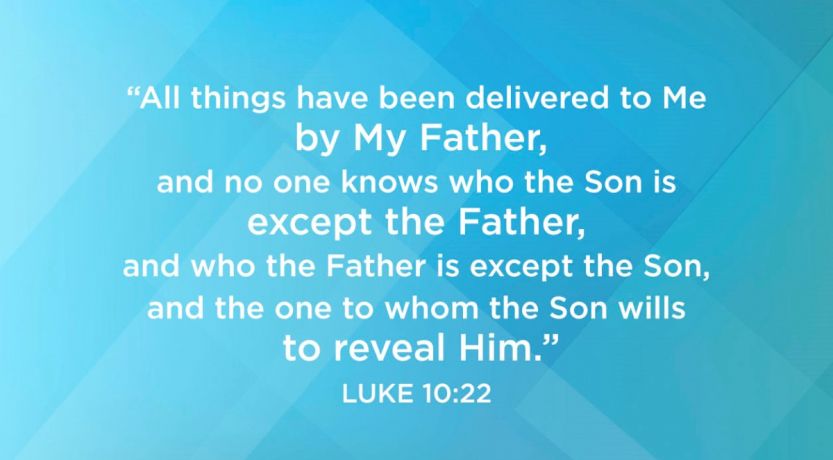Though most of Christianity professes a belief in the Father, He is rarely focused on. But Jesus Christ was Father-centered and revealed His Father to us.

In my previous article “Who Are You Calling ‘Father’?” we discussed why the term Father, in a religious context, should be reserved solely for God the Father. I’d like to begin this column with a question: How much do you know about God the Father?
God the Father
Many churchgoing people think of God the Father as a part of an impossible-to-understand Trinity. (Read what the Bible teaches about this in our Life, Hope & Truth article “The Trinity: What Is It?”)
Many also think of Him as the strict God of the Old Testament, in contrast to Christ, viewed as the loving, merciful Lord of the New Testament.
Or you may admit you know little about Him.
Christ-centered?
Though Christianity accepts the existence of the Father, the reality is that He is relegated to the background in many churches. Evangelicals emphasize Jesus as Lord, getting to know Jesus, having a relationship with Jesus, even praying to Jesus. At times the impression is that God the Father has quietly disappeared.
One of the buzz phrases of modern Christianity is “Christ-centered.” Churches label themselves as “Christ-centered” communities. Ministries talk about leading people to Christ and teaching them to live a “Christ-centered” life. Writers talk about a “Christ-centered” approach to everything from parenting to yoga!
There is no doubt about it—Jesus is vital to true Christianity. Jesus said: “I am the way, the truth, and the life” (John 14:6). He is the way to salvation. He is the source of truth. He is the path for an abundant life. But notice what He said at the end of that verse:
“No one comes to the Father except through Me.”
“That they may know You”
Jesus didn’t come just to bring us to Himself—He said one of the principal reasons He came was to lead us to the Father!
In fact, the evening before He was crucified, Jesus made this statement in prayer to His Father: “And this is eternal life, that they may know You, the only true God, and Jesus Christ whom You have sent” (John 17:3, emphasis added).
Think about that statement. Jesus said He came to reveal and help us “know” God the Father—and that knowing the Father was necessary for eternal life!
Yet many of the churches that claim to follow Christ rarely talk about the Father. They don’t talk about being “Father-centered” or being driven by a mission to “lead people to the Father.” They neglect the Father. Yet Christ said that knowing the Father is essential to have eternal life.
Do you know the Father?
In order to learn about Him, let’s examine some of the important facts Jesus teaches us about the Father in the Gospel accounts.
1. The Father wasn’t widely known before Christ’s coming.
One of the most fascinating truths in the New Testament is that the God the Jews professed to worship—the One who talked to people in the Old Testament—was actually the One who came to earth as Jesus Christ.
John 1 reveals that being as “the Word.” “All things were made through Him” (verse 3), and later “the Word became flesh and dwelt among us” (verse 14)—coming to earth as Jesus Christ. In fact, when Jesus revealed Himself as the “I AM” of the Old Testament, it almost got Him killed by a Jewish mob on the spot (John 8:58-59; see also Exodus 3:14)!
Jesus also said, “No one has seen God at any time. The only begotten Son, who is in the bosom of the Father, He has declared Him” (John 1:18).
It wasn’t until Christ came that the Father’s identity was clearly revealed to human beings in plain language (Luke 10:22). In fact, the Old Testament primarily tells about the being who became Christ, while the New Testament primarily reveals the Father. Yes, the reality is the exact opposite of the common Christian perception!
To learn more about this crucial topic, read our article “Jesus Christ Was the God of the Old Testament.”
2. Jesus emphasized the Father.
There is more to Christianity than Jesus Christ alone. This may be a paradigm-shattering statement to some in the Christian world. But if we honestly examine the words of Christ, we see that is exactly what He taught.
There is more to Christianity than Jesus Christ alone. ... That is exactly what He taught.
Yes, Jesus is absolutely essential. Without His sacrifice and life, we would die in our sins (John 3:16; Acts 4:12). He is our Savior, and without Him we have no hope. We can’t underestimate His importance. But if we believe what He actually said, then we have to accept that Jesus taught us to seek the Father first. He was constantly emphasizing and highlighting the Father. He didn’t come doing His own will, “but the will of the Father” who sent Him (John 5:30).
Jesus said that one of the distinguishing marks of His true followers was that “true worshipers will worship the Father in spirit and truth; for the Father is seeking such to worship Him” (John 4:23, emphasis added). This is a direct challenge to those who neglect the Father.
Jesus Christ directed worship and attention to the Father. He taught us to “pray to your Father” (Matthew 6:6; see also Luke 11:2). He taught us to live by “My Father’s commandments and abide in His love” (John 15:10). He said that by setting a right example we “glorify your Father in heaven” (Matthew 5:16).
Do you emphasize the Father in your life?
3. Jesus spoke the words of the Father.
The idea that there is a disconnect between a harsh, distant Father and a merciful, loving Jesus is one of the most unfortunate ideas that has arisen in Christianity. Jesus actually taught that He and the Father are perfectly united by identical character.
Jesus said plainly, “I and My Father are one” (John 10:30). He didn’t mean They were the same being, but that They shared the exact same purpose and character. Their character can be summed up as “love” (1 John 4:8)—unselfish, outgoing concern for each other and the creation.
When asked by one of His disciples to show them the Father, Jesus explained that knowing Him was like knowing the Father (John 14:9) because “the word which you hear is not Mine but the Father’s who sent Me” (verse 24). In other words, He spoke the words given to Him by the Father (John 6:38; 7:16-18; 8:28, 38, 40; 12:49; 14:10; 17:8). He labeled His work “My Father’s business” (Luke 2:49).
So when we read the words of Jesus Christ in the Bible, we should remember they were inspired by the Father. In essence, Jesus serves as the spokesman for the Father, communicating His message to human beings. So, one of the major ways we can learn about the Father is by carefully studying the life and teachings of Jesus Christ!
There is no disconnect between the Father and Christ.
4. The Father was the source of Jesus’ power to do miracles.
Jesus has often been seen as a miracle worker with superhuman powers. But here is another paradigm-shattering fact: When He walked the earth, Jesus depended on the Father for the power to work miracles. When He came to earth, He divested Himself of His divine powers and came as a mortal, flesh-and-blood human being, and made Himself subject to the limits of physical life (Philippians 2:6-8; John 1:14).
Jesus said on multiple occasions that He was powerless to do anything supernatural by Himself (John 5:19, 30; 8:28). So what about all His miracles—turning water into wine (John 2:1-11), raising people from the dead (Matthew 9:18-26; Luke 7:11-17; John 11:1-44) or walking on water (Matthew 14:22-26)?
Jesus directly addressed how He was able to perform these miracles: “Do you not believe that I am in the Father, and the Father in Me? The words that I speak to you I do not speak on My own authority; but the Father who dwells in Me does the works” (John 14:10).
It was the Father who performed the miracles through Jesus—because of Christ’s living faith (Matthew 17:20). Peter later confirmed that Jesus’ works and healings were possible because “God [the Father] was with Him” (Acts 10:38).
It’s all about the Father
It is clear from Jesus’ words that the Father was at the center of His thoughts, teachings, prayers and worship. Jesus came to reveal the Father to us—and to lead us to Him! It is through Christ’s sacrifice that we can have access to God the Father (Ephesians 2:18; 1 Peter 3:18). That is why we pray to the Father “in the name” of Jesus Christ. In fact, God’s plan of salvation for mankind will culminate in Christ delivering “the kingdom to God the Father” (1 Corinthians 15:24).
Everything Jesus said and did—and, in fact, the entire Bible—leads us to the Father.
Are you “Father-centered”?
To learn more about the important roles of God the Father, read “What Does the Father Do? Part 1” and Part 2 on the Life, Hope & Truth website.





